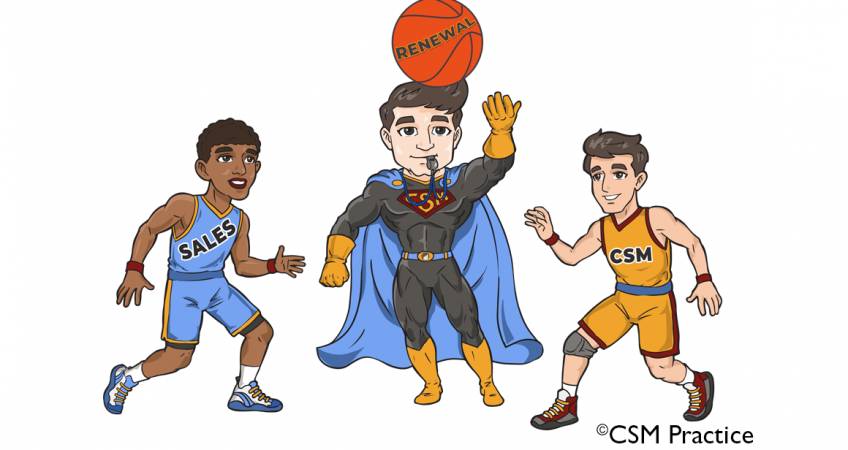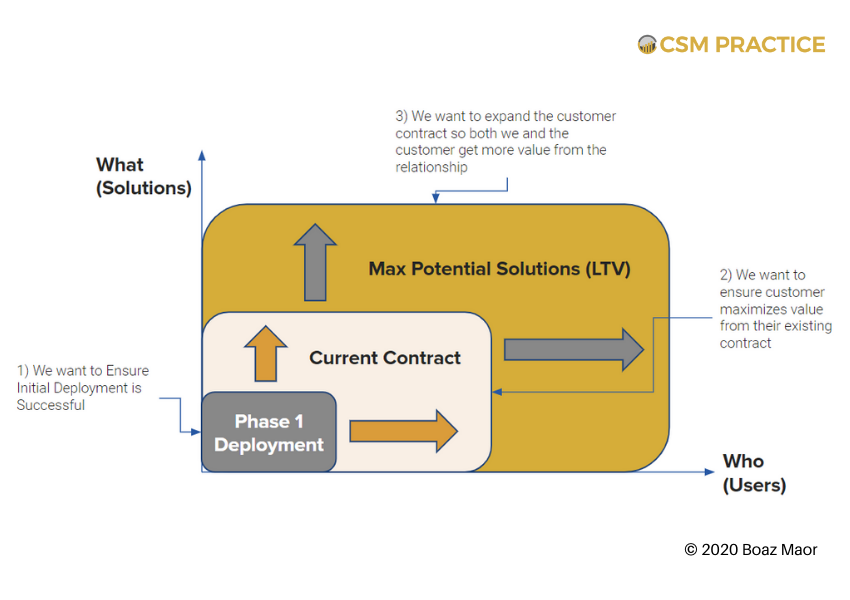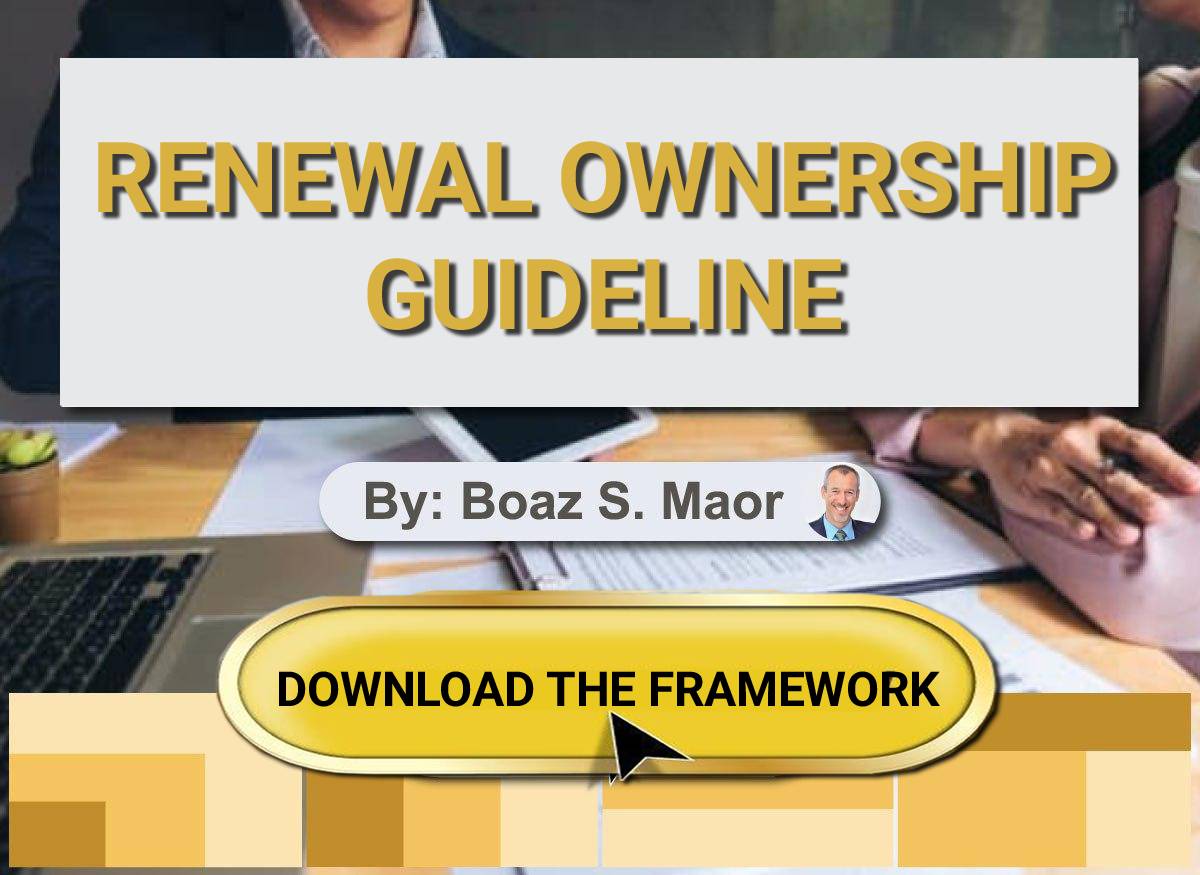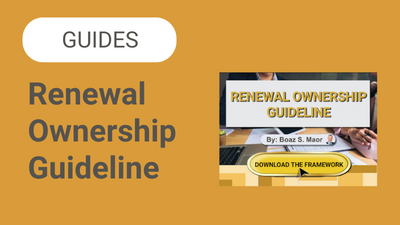In whatever situation, the question “Who should own the renewals and upsells?” is a crucial topic among the Customer Success community. That said, many experts in this field are taking time to brainstorm to come up with a specific answer to the question, “Is it sales or customer success’ responsibility?”.
However, the posted question was countered by Boaz Maor, Chief Customer Officer at Talech, who explained the new methodology that will help you think through how to align the commercial responsibilities between sales and CSMs and why it is vital to maximizing customer success. This maximization is an important factor in business, as it is also aiming to maximize the total revenues that every customer generates for the company. Before diving into the question, let’s find out who’s doing the renewals and upsells process. Maor discussed the “land and expand strategy” as a supporting strategy for this topic.
WHAT LAND AND EXPAND STRATEGY IS
The land and expand process, like a sales process, should have defined stages, activities, and objectives.
Three Objectives of Land and Expand Strategy
- We want to ensure the initial deployment is successful.
- We want to ensure the customer maximizes value from their existing contract
- We want to expand the customer contract so both the company and the customer get more value from the relationship
As Maor puts it, “A smart organization thinks about always being on the side of the customers and say what does the customer need? How can I maximize the customer’s value? And if to maximize value to the customers, I need to tweak the contract, add capabilities, upsell certain products, etc.”
Now, the question to ponder is: Who should own the responsibility for maximizing the value within the current contract, and then who should maximize the potential solutions, especially on the transactional and financial side?
Generally, there are three options to manage the commercials of existing customers to maximize the customer’s value:
ALL SALES: Sales Execs drive all commercial activity, while CSMs engage in non-commercial activities such as driving outcomes, customer success, and advocacy.
UPSELLS vs. RENEWALS SPLIT: Sales Execs drive new revenue activities including upsells and cross-sells, while CSMs drive the management of existing commercial engagements, (i.e., renewals) alongside the non-commercial work.
ALL CSM: Sales Execs drive sales to “new” customers only, while CSMs manage all commercial activities with existing customers including both renewals, upsells, cross-sells.
Each option has its advantages and disadvantages, hence, executives in the organization should take time to decide what appropriate strategy should be chosen. But, how should the executives make the decision that best serves the company?
In explaining this question, there are two primary vectors Maor shared and would like us to reflect upon:
1. Duration of Sales Cycle
The first one is the duration of the sale cycle. The longer the sales cycle, the more time, energy, and effort the salesperson has put to create the relationships which are the sole key to serving the customers. The larger the initial time and cost, the less it makes sense to transfer those relationships to a different person (CSM), and the more it makes sense to maintain the ownership of the relationships with the Sales Executive. It is worth noting that the length of the sales cycle corresponds with the size of the target market and the expected revenue from them. More relevant deals can justify longer sales cycles, and smaller deals can only be viable if their sales cycles are short.
2. Type of Upsell
The second criterion vector you should think about is the type of upsell.
As explained by Maor,
“The more upsells come from “more of the same” (increased pricing, higher consumption, organic growth, expansion of features, etc.), the more it makes sense for the person who manages the ongoing working relationship with the customer (the CSM) to drive those upsells. The more the upsells come from NEW sales – new products, new divisions – the more sales work is needed, and the more it makes sense for the salesperson, not the CSM to own this task.”
Think about the types of commercial activities that can be performed such as Renewal, Upselling, and Cross-selling.
Taking these two vectors together should enable any company to either formulate a new or use an existing strategy that optimizes its business.
What Boaz discussed is definitely more appropriate to the earlier phases, when companies are tens or hundreds of people. The earlier phases are often called the growth phases, where the length of extended motion is critical. The answer to the question, “Who should own the renewals and upsells?” constantly changes as it depends on the situation. This way, it would help to align the objectives more carefully with the customers.
Therefore, you need to carefully think about:
- How do I optimize the salespeople’s time?
- How do I optimize the CSM’s time?
- How do I create effectiveness?
- Which team is doing the best thing?
- Which team is doing it in the most cost-effective way?
- How does the size of the customer factor into commercial responsibilities?
- How does the size of the SaaS company impact commercial responsibilities?
- How does the Customer Success organization fit into the overall organizational structure?
With these questions in mind, you can definitely come up with a remarkable strategy that would help your organization to achieve success.
How can CSM Practice Help!
At CSM Practice we elevate SaaS companies’ profitable growth through customer retention and expansion selling strategies. We can help you align the commercial responsibility between Sales and Customer Success, hence, resulting in a much clearer understanding of who should own what. Our work ranges from developing a simple set of calls to action to developing and implementing comprehensive customer nurturing strategies.
Take it to the next level! Ask CSM Practice about the services we provide and learn how we can help you transform your organization into success.




